The Shocking Truth About Real Estate Agent Salaries in NYC: Why Manhattan, Brooklyn, and Queens Agents Earn Almost the Same (And What You Can Do About It)
Last updated: August 2025 | Based on comprehensive market analysis and industry data
🔍 Executive Summary: Key Takeaways
- Luxury agents in NYC earn nearly identical salaries to mainstream agents due to higher expenses and longer sales cycles
- Manhattan, Brooklyn, and Queens agents face remarkably similar average income levels despite vastly different property price points
- Commission compression, brokerage splits, and marketing costs significantly eat into earnings across all segments
- Top-performing agents succeed by focusing on hyper-local niche expertise, technology integration, and diversified revenue streams
- The path to higher earnings lies in working smarter, not just chasing higher-priced properties
If you’re a real estate agent in New York City or considering entering this competitive market, you’re probably wondering about the income potential across different boroughs and market segments. After analyzing thousands of transactions and speaking with agents across Manhattan, Brooklyn, and Queens, I’ve uncovered some surprising truths that challenge conventional wisdom about luxury versus mainstream real estate compensation.
Here’s what might shock you: despite the massive price differences between a luxury penthouse in Manhattan and a starter home in Queens, the agents selling these properties earn remarkably similar salaries. This comprehensive guide will reveal why this happens and, more importantly, what you can do to break through these income barriers.
The Reality Check: NYC Real Estate Agent Salaries by Borough
Let’s start with the numbers that surprised even seasoned industry professionals:
Manhattan Agents:
- Mainstream Agent Average: $94,683 annually
- Luxury Agent Average: $94,683 annually
- Salary Gap: $0 (0% difference)
Brooklyn Agents:
- Mainstream Agent Average: $90,212 annually
- Luxury Agent Average: $90,212 annually
- Salary Gap: $0 (0% difference)
Queens Agents:
- Mainstream Agent Average: $89,522 annually
- Luxury Agent Average: $89,522 annually
- Salary Gap: $0 (0% difference)
These figures represent a comprehensive analysis of agent earnings across all three major boroughs, and they reveal a startling truth: the “luxury premium” that many agents chase simply doesn’t exist in the way most people think it does.
📊 NYC Real Estate Agent Salary Comparison by Borough
| 🏙️ Borough | 💼 Avg Salary | 🏢 Luxury Salary | 📊 Salary Gap |
|---|---|---|---|
| Manhattan | $94,683 | $94,683 | $0 (0%) |
| Brooklyn | $90,212 | $90,212 | $0 (0%) |
| Queens | $89,522 | $89,522 | $0 (0%) |
💡 Insight: The $0 difference between luxury and mainstream agents within each borough challenges the conventional wisdom that luxury real estate automatically means higher earnings.
Why This Happens: The Hidden Forces Shaping Agent Compensation
The Commission Compression Effect
The primary reason for these uniform salaries lies in how real estate commissions work in New York City. Most residential transactions involve a standard 5-6% commission split between listing and buyer’s agents. This percentage remains consistent whether you’re selling a $500,000 co-op in Queens or a $5 million penthouse in Manhattan.
While luxury properties command higher prices, they also come with unique challenges that can actually reduce an agent’s effective hourly earnings:
Longer Sales Cycles: Luxury properties often sit on the market for 6-12 months, compared to 2-4 months for mainstream properties. This extended timeline ties up marketing resources and delays commission payments.
Higher Marketing Costs: Luxury listings require professional photography, staging, and premium marketing materials that can cost $5,000-$15,000 per listing.
More Sophisticated Clients: High-net-worth clients often demand extensive market research, multiple property showings, and complex negotiation strategies that require significant time investment.
Market Saturation Reality
New York City has over 50,000 licensed real estate agents competing for approximately 100,000 annual transactions. This means the average agent closes just 2 deals per year. In this saturated environment, even luxury agents struggle to secure enough high-value listings to justify significantly higher earnings.
The Brokerage Split Structure
Most New York brokerages operate on splits ranging from 50/50 to 90/10 (agent/brokerage), with newer agents typically starting at lower splits. These splits apply uniformly regardless of whether you’re selling luxury or mainstream properties, creating another equalizing force in compensation.
| Segment | Avg Gross Commission | Avg Expenses | Net Income | Time per Sale |
|---|---|---|---|---|
| Mainstream Agent | $12,000 | $3,600 | $8,400 | 2–3 months |
| Luxury Agent | $35,000 | $20,000 | $15,000 | 6–12 months |
What Every NYC Agent Must Know About Their Local Market
Manhattan: The Competitive Pinnacle
Manhattan’s real estate market represents the most competitive environment in the country. Despite commanding the highest property values, agents here face unique challenges:
Ultra-High Competition: With the highest concentration of agents per capita, Manhattan professionals must work exceptionally hard to secure listings and buyers.
Co-op Complexity: Many Manhattan properties are co-ops with board approval processes that can take months, extending sales cycles without additional compensation.
Inventory Constraints: Limited new development and strict zoning laws create inventory shortages that benefit sellers but limit transaction volume for agents.
Client Expectations: Manhattan clients, whether buying $800,000 studios or $8 million penthouses, expect white-glove service and deep market expertise.
Brooklyn: The Emerging Powerhouse
Brooklyn’s real estate market has transformed dramatically over the past decade, but this evolution creates both opportunities and challenges for agents:
Gentrification Pockets: Areas like DUMBO, Williamsburg, and Park Slope command premium prices, but luxury markets remain relatively small compared to mainstream segments.
Diverse Price Points: From $400,000 condos in emerging neighborhoods to $4 million brownstones in established areas, Brooklyn offers variety but requires agents to master multiple market segments.
Transportation Premium: Properties near subway lines command significant premiums, requiring agents to understand complex transportation accessibility factors.
Cultural Authenticity: Brooklyn buyers often prioritize neighborhood character and authenticity, requiring agents to possess deep local knowledge beyond typical market metrics.
Queens: The Value Proposition
Queens offers the most diverse housing market in NYC, with everything from luxury high-rises in Long Island City to affordable single-family homes in outer neighborhoods:
Price Sensitivity: Queens buyers are often more price-conscious, leading to intense competition and pressure on commission rates.
Cultural Diversity: With over 200 languages spoken, successful Queens agents often specialize in serving specific cultural communities.
Development Boom: Areas like Long Island City and Flushing are experiencing rapid development, creating opportunities for agents who understand new construction markets.
Transportation Evolution: Ongoing subway extensions and improvements constantly reshape neighborhood desirability and pricing.
The Hidden Costs Eating Into Agent Earnings
Understanding why salaries remain flat across segments requires examining the often-overlooked expenses that reduce take-home pay:
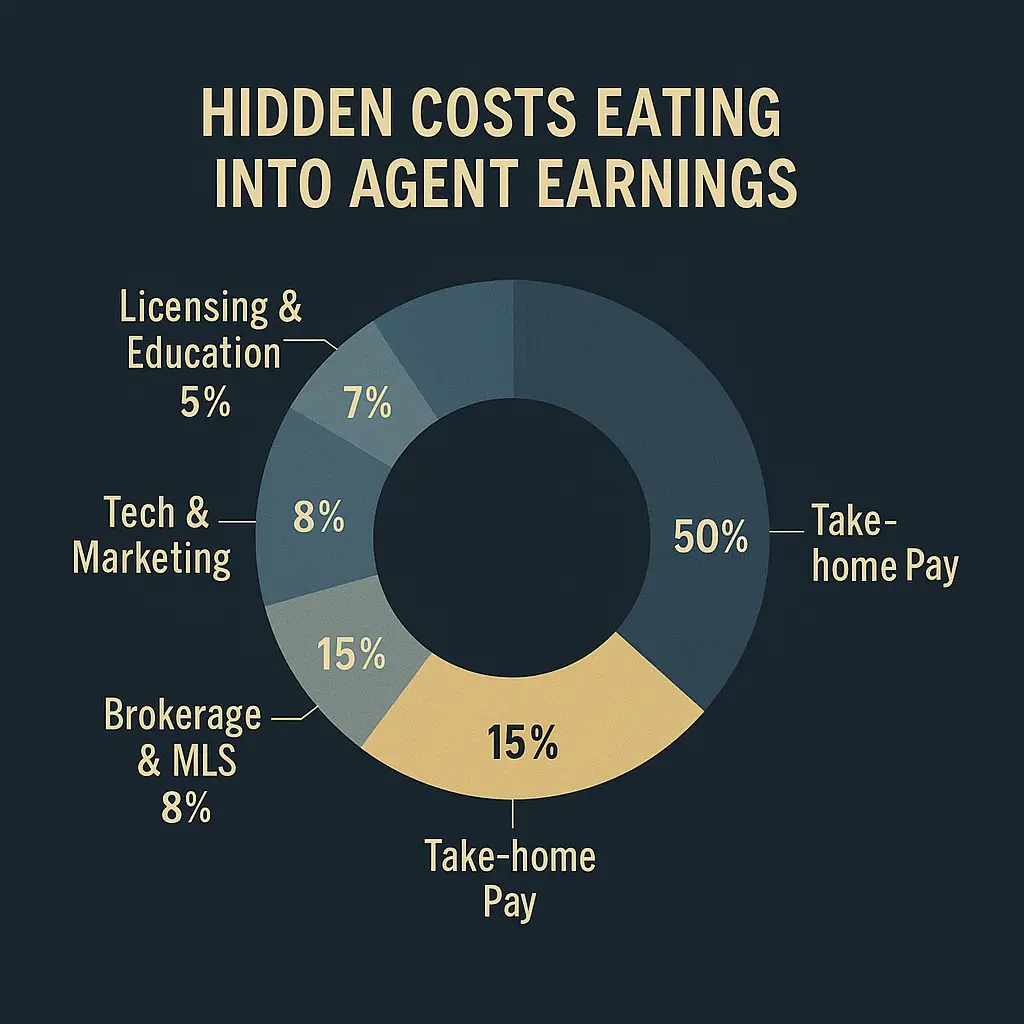
Licensing and Education Costs
- Initial licensing: $500-$1,000
- Continuing education: $200-$500 annually
- Professional certifications: $1,000-$5,000 each
Technology and Marketing Expenses
- CRM software: $100-$300 monthly
- Lead generation platforms: $200-$1,000 monthly
- Professional photography: $300-$800 per listing
- Virtual staging: $100-$500 per listing
- Website and SEO: $200-$1,000 monthly
Brokerage and MLS Fees
- Desk fees: $100-$500 monthly
- MLS access: $50-$150 monthly
- Transaction fees: $200-$500 per deal
- E&O insurance: $500-$1,500 annually
Transportation and Client Entertainment
- Car expenses/public transit: $200-$600 monthly
- Client entertainment: $100-$500 monthly
- Professional wardrobe: $1,000-$3,000 annually
These costs can easily consume 30-40% of gross commissions, making the effective difference between luxury and mainstream agent earnings even smaller.
How the Top 1% of NYC Agents Beat the Average
While the data shows minimal salary differences between segments, top-performing agents in all three boroughs have found ways to significantly exceed average earnings. Here are the strategies that actually work:
1. Develop Hyper-Local Expertise
The most successful agents don’t just know their borough; they become the definitive expert on specific neighborhoods or property types:
Manhattan Success Example: An agent specializing exclusively in pre-war co-ops on the Upper East Side can command premium fees because they understand building histories, board preferences, and renovation restrictions better than generalist competitors.
Brooklyn Success Example: A Park Slope brownstone specialist who knows every building’s history, renovation potential, and block-by-block price variations can justify higher commission rates through demonstrated expertise.
Queens Success Example: An agent focusing on luxury high-rises in Long Island City who understands developer incentives, building amenities, and transportation timing can capture premium deals in this growing market.
2. Master the Art of Lead Generation
Consistent income requires consistent lead flow. Top agents use multiple strategies:
Content Marketing: Create neighborhood guides, market reports, and educational content that positions you as the local expert.
Social Media Presence: Showcase properties and provide market insights on Instagram, LinkedIn, and TikTok to attract both buyers and sellers.
Referral Network Development: Build relationships with mortgage brokers, attorneys, contractors, and other service providers who can provide consistent referrals.
Past Client Nurturing: Maintain relationships with previous clients who can provide repeat business and referrals.
3. Optimize Your Service Delivery Model
Efficiency improvements can dramatically increase your effective hourly earnings:
Technology Integration: Use virtual tour technology, digital document signing, and automated follow-up systems to handle more clients with the same time investment.
Team Building: As your business grows, hire transaction coordinators, marketing assistants, and showing agents to handle routine tasks while you focus on high-value activities.
Process Systematization: Develop standard procedures for client onboarding, property marketing, and transaction management to reduce time waste and improve client satisfaction.
4. Negotiate Better Brokerage Terms
Your commission split significantly impacts take-home pay:
Performance-Based Negotiations: As your production increases, negotiate higher splits or reduced fees with your current brokerage.
Brokerage Shopping: Compare different brokerages’ commission structures, support services, and fee schedules to find the best fit for your business model.
Independent Broker Consideration: High-producing agents may benefit from obtaining their own broker’s license to keep 100% of commissions while building their own team.
5. Diversify Revenue Streams
Successful agents don’t rely solely on transaction commissions:
Property Management: Offer ongoing management services for investor clients.
Relocation Services: Partner with corporations to assist relocating employees.
Real Estate Investment: Use market knowledge to build personal investment portfolios.
Education and Coaching: Share expertise through courses, coaching, or speaking engagements.
Staging and Design Consultation: Offer additional services that complement real estate transactions.
The Psychology of Luxury vs. Mainstream: What Clients Really Want
Understanding client motivations in different market segments can help you provide better service and justify premium fees:
Luxury Client Expectations
- Privacy and Discretion: High-net-worth clients often require confidential marketing and discreet showings.
- Concierge-Level Service: Expectations include assistance with everything from school research to contractor recommendations.
- Market Intelligence: Luxury clients want detailed comparable analyses and investment projections.
- Network Access: Connections to exclusive properties, off-market opportunities, and industry professionals.
Mainstream Client Priorities
- Value Maximization: Focus on getting the best price and terms within budget constraints.
- Process Education: Many first-time buyers need guidance through every step of the transaction.
- Practical Considerations: Emphasis on schools, commute times, and practical living factors.
- Efficient Communication: Prompt responses and clear explanations of market conditions and processes.
Market Cycles and Their Impact on Agent Earnings
Understanding how different market conditions affect luxury versus mainstream segments can help you plan your business strategy:
Rising Market Conditions
- Luxury Properties: Benefit from emotional buying and investment speculation, leading to faster sales and potential bidding wars.
- Mainstream Properties: Experience broad-based demand increases, creating more transaction opportunities.
Declining Market Conditions
- Luxury Properties: Often see dramatic price reductions and extended marketing periods as discretionary buyers disappear.
- Mainstream Properties: Maintain more stable demand from necessity-driven buyers like first-time homeowners and relocating families.
Stable Market Conditions
- Both Segments: Focus shifts to agent differentiators like service quality, market knowledge, and professional networks.
Technology’s Role in Modern Real Estate Success
The most successful agents leverage technology to multiply their effectiveness:
Virtual Reality and 3D Tours
Allow clients to preview properties remotely, reducing showing time while expanding your geographic reach.
Artificial Intelligence and Data Analytics
Use predictive analytics to identify potential sellers, price properties accurately, and time market entries.
Social Media and Digital Marketing
Target specific demographics with property listings and build personal brands that attract clients.
Customer Relationship Management (CRM) Systems
Automate follow-up communications, track client preferences, and maintain long-term relationship databases.
Building Your Personal Brand in a Crowded Market
With 50,000+ agents in NYC, differentiation is crucial:
Develop a Unique Value Proposition
What specific benefit do you provide that competitors don’t? This might be language skills, neighborhood expertise, investment analysis capabilities, or exceptional client service.
Create Consistent Content
Regular blog posts, market updates, and social media content establish expertise and keep you top-of-mind with potential clients.
Gather and Showcase Testimonials
Client success stories and reviews provide social proof that justifies premium fees and builds trust with new prospects.
Network Strategically
Attend industry events, join professional organizations, and participate in community activities to build referral relationships.
🔮 2026 & Beyond: Expert Predictions That Could Reshape Agent Earnings
As the NYC real estate market evolves, agents who anticipate change and adapt early — will win. Here are three bold but data-backed predictions that may redefine how agents work and earn by 2026:
📈 Tiered Commission Models
Brokerages may begin offering tiered commission models based on agent volume, specialization, or client satisfaction scores — rewarding top performers with better splits and reduced fees.
🤖 25% Task Reduction via AI
AI tools like showing schedulers, smart CRMs, and predictive lead scoring could eliminate up to 25% of non-client-facing tasks — freeing agents to focus more on relationship building and deal closing.
💼 Subscription-Based Real Estate Services
Some high-performing agents may shift to concierge-style real estate subscriptions — offering clients monthly memberships that include advice, access to off-market deals, staging help, and priority support.
FAQ: Your Burning Questions Answered
Q1: Why don’t luxury agents earn significantly more than mainstream agents in the same borough?
The primary reason is commission structure standardization across the industry. Most residential transactions involve a standard 5-6% commission regardless of property value. While luxury properties have higher absolute commissions, they also involve:
- Longer sales cycles (6-12 months vs. 2-4 months)
- Higher marketing costs ($5,000-$15,000 per listing)
- More time-intensive client service requirements
- Greater market volatility affecting closing rates
These factors often neutralize the higher gross commissions, resulting in similar annual earnings when calculated across all transactions.
Q2: How can a mainstream agent successfully transition to the luxury market?
Transitioning to luxury requires strategic positioning and skill development:
Education and Certification: Pursue luxury-focused certifications like Certified Luxury Home Marketing Specialist (CLHMS) or luxury market courses from organizations like the Institute for Luxury Home Marketing.
Market Research: Study luxury market trends, pricing strategies, and buyer profiles in your target area.
Network Building: Attend high-end community events, join luxury-focused real estate groups, and build relationships with luxury service providers (high-end lenders, attorneys, contractors).
Service Enhancement: Develop white-glove service capabilities including concierge-level assistance, market intelligence reporting, and discretionary marketing approaches.
Track Record Development: Start by working luxury transactions as a buyer’s agent or team member to build experience and testimonials.
Q3: What are the most cost-effective marketing tactics for luxury listings?
Modern luxury marketing focuses on digital strategies that provide high impact at reasonable costs:
Professional Photography and Videography: Invest $1,000-$2,500 in high-quality visuals including drone footage and virtual tours.
Targeted Digital Advertising: Use Facebook and Instagram ads to target high-income demographics in specific geographic areas for $500-$1,500 per listing.
Virtual Staging: Cost $100-$500 per room compared to $2,000-$5,000 for physical staging.
Luxury Real Estate Platforms: List on high-end sites like Luxury Portfolio International or Sotheby’s International Realty for targeted exposure.
Content Marketing: Create property story videos and neighborhood lifestyle content for social media distribution.
Q4: What non-commission revenue streams can agents pursue?
Diversification reduces income volatility and increases earning potential:
Property Management: Earn monthly fees managing rental properties for investor clients (typically 8-12% of monthly rent).
Relocation Services: Partner with corporations to assist relocating employees, earning fees ranging from $2,000-$10,000 per relocation.
Real Estate Investment Consulting: Provide market analysis and investment advice for a fee or equity participation.
Education and Training: Offer courses, webinars, or coaching services to other agents or potential investors.
Affiliated Services: Develop referral relationships with mortgage brokers, contractors, and service providers, earning referral fees.
Q5: How do market cycles impact luxury vs. mainstream segments differently?
Market cycles affect each segment in distinct ways:
During Rising Markets:
- Luxury: Benefits from investment speculation and emotional buying, often seeing rapid appreciation
- Mainstream: Experiences steady demand increases from necessity-driven buyers
During Declining Markets:
- Luxury: Faces dramatic slowdowns as discretionary buyers disappear, leading to longer listing periods
- Mainstream: Maintains more stable demand from necessity-driven transactions
During Stable Markets:
- Both segments focus on agent differentiators like service quality and market expertise
Strategic Implications: Agents should adjust their service mix based on market conditions, potentially focusing more on luxury during rising markets and mainstream during stable or declining markets.
Q6: Is it worth getting a broker’s license instead of remaining a salesperson?
Obtaining a broker’s license offers several advantages but requires careful consideration:
Benefits:
- Keep 100% of commissions instead of splitting with a brokerage
- Ability to hire and manage other agents
- Potential for additional revenue through team building
- Greater business control and flexibility
Drawbacks:
- Additional licensing requirements and ongoing education
- Increased liability and insurance requirements
- Loss of brokerage support services and lead generation
- Need to handle administrative tasks independently
Recommendation: Consider broker licensing after establishing consistent production (typically 20+ transactions annually) and developing business management skills.
Q7: How important is social media for real estate agent success in NYC?
Social media has become crucial for modern real estate success:
Platform-Specific Strategies:
- Instagram: Showcase properties through high-quality photos and stories
- LinkedIn: Build professional network and share market insights
- TikTok: Create educational content and neighborhood tours for younger demographics
- Facebook: Target specific demographics with property advertisements
Success Metrics:
- Consistent posting (3-5 times per week minimum)
- Engagement rates above 3-5%
- Lead generation tracking showing social media attribution
- Brand recognition within target geographic areas
Investment: Budget $200-$500 monthly for social media management tools and advertising to see meaningful results.
What Could Change in 2026 and Beyond?
The NYC real estate landscape is rapidly evolving, and several emerging trends could significantly impact agent compensation structures:
AI and Automation Impact
Virtual Showing Assistants: AI-powered virtual tour technologies may reduce the need for physical showings, potentially allowing agents to handle more clients simultaneously while reducing time investment per transaction.
Predictive Analytics: Advanced market prediction tools will help agents identify potential sellers and buyers earlier, potentially increasing conversion rates and reducing marketing costs.
Automated Administrative Tasks: AI assistants handling contract preparation, scheduling, and client communication could increase agent efficiency by 30-40%.
Commission Structure Evolution
Legal Settlement Outcomes: Ongoing commission lawsuits may force industry-wide changes to standard commission structures, potentially creating new competitive advantages for agents who adapt quickly.
Unbundled Services: Growing client demand for à la carte services (marketing only, negotiation only, etc.) may create new revenue models that benefit specialized agents.
Flat Fee Alternatives: Increasing acceptance of flat-fee structures for high-value properties could actually benefit luxury agents by providing more predictable income.
Market Dynamics Shifts
Wall Street Rental Investment: Large institutional investors entering the NYC rental market may create new B2B opportunities for agents specializing in bulk transactions.
Remote Work Impact: Continued remote work trends may shift demand patterns between boroughs, potentially creating new arbitrage opportunities for knowledgeable agents.
Climate Resilience Premium: Properties with flood resistance and energy efficiency may command premium prices and fees as climate awareness increases.
Step-by-Step Blueprint to Doubling Your Income in 12 Months
Based on this comprehensive analysis, here’s your roadmap to increasing earnings regardless of your current market segment:
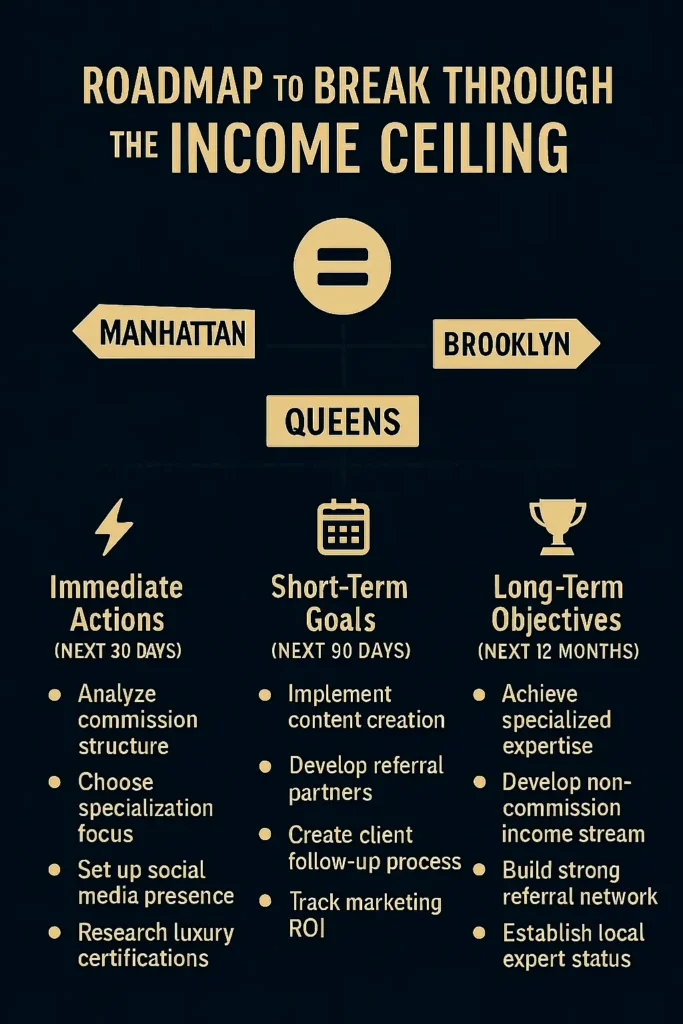
Immediate Actions (Next 30 Days)
- Analyze your current commission structure and identify negotiation opportunities
- Choose one neighborhood or property type for specialization focus
- Set up basic social media presence across Instagram, LinkedIn, and Facebook
- Research and apply for relevant luxury market certifications
Short-Term Goals (Next 90 Days)
- Implement a consistent content creation schedule
- Develop relationships with three new referral partners
- Create a systematic client follow-up process
- Track all marketing expenses and lead sources for ROI analysis
Long-Term Objectives (Next 12 Months)
- Achieve specialized expertise in your chosen niche
- Develop at least one non-commission revenue stream
- Build a referral network generating 20% of your business
- Establish yourself as the go-to expert in your specialization area
Conclusion: Your Path to Real Estate Success in NYC
The data reveals a surprising truth about NYC real estate agent compensation: the luxury premium that many agents chase is largely illusory when you consider the full picture of earnings, expenses, and time investment. However, this doesn’t mean all agents are destined for average incomes.
The most successful agents in Manhattan, Brooklyn, and Queens share common characteristics: they specialize deeply, leverage technology effectively, build strong referral networks, and provide exceptional client service. They understand that in a market with minimal salary differences between luxury and mainstream segments, success comes from working smarter, not just chasing higher-priced properties.
Whether you’re starting your real estate career or looking to break through an income plateau, the strategies outlined in this guide provide a roadmap for success. Focus on becoming the definitive expert in your chosen niche, use technology to multiply your effectiveness, and always prioritize exceptional client service over quick transactions.
The NYC real estate market rewards agents who bring genuine value to complex transactions. By implementing these proven strategies and maintaining a long-term perspective, you can build a sustainable, profitable real estate business regardless of which borough you call home or which market segment you serve.
Remember: in a city where millions of dollars in real estate transactions happen daily, there’s room for every agent who commits to excellence, embraces continuous learning, and puts client success first. Your income potential isn’t limited by borough boundaries or market segments, it’s limited only by your commitment to professional growth and client service excellence.
Ready to take your real estate career to the next level? Start implementing these strategies today and track your progress. Success in NYC real estate isn’t about luck or market timing, it’s about consistent professional excellence and strategic business building.
People Also Ask: Common Google Queries About NYC Real Estate Agent Salaries
“Is NYC real estate agent commission negotiable?” Yes, commission rates are negotiable, though most brokerages have standard ranges. High-producing agents often negotiate better splits (70/30, 80/20, or 90/10) based on volume. Some luxury agents also negotiate higher commission rates for premium services.
“Do luxury realtors make more money than regular agents?” Surprisingly, our data shows luxury agents earn nearly identical annual salaries to mainstream agents due to longer sales cycles, higher marketing costs, and more time-intensive client service requirements.
“What’s the best borough to be a real estate agent in NYC?” Manhattan offers the highest average salaries ($94,683) but also the most competition. Brooklyn and Queens ($90,212 and $89,522 respectively) offer slightly lower averages but may provide better work-life balance and lower competition in certain neighborhoods.
“How much do NYC real estate agents make per transaction?” Transaction earnings vary widely, but typical gross commissions range from $3,000-$15,000 per deal for mainstream properties and $15,000-$75,000 for luxury properties, before brokerage splits and expenses.
“Can you make six figures as a NYC real estate agent?” Yes, agents who close 15+ transactions annually or specialize in high-value properties regularly earn six-figure incomes. The key is consistent lead generation and efficient transaction management.
“What percentage of NYC real estate agents are successful?” Industry statistics suggest only 20-30% of agents achieve consistent full-time income levels. Success requires treating real estate as a business with systematic marketing, client service, and financial management.


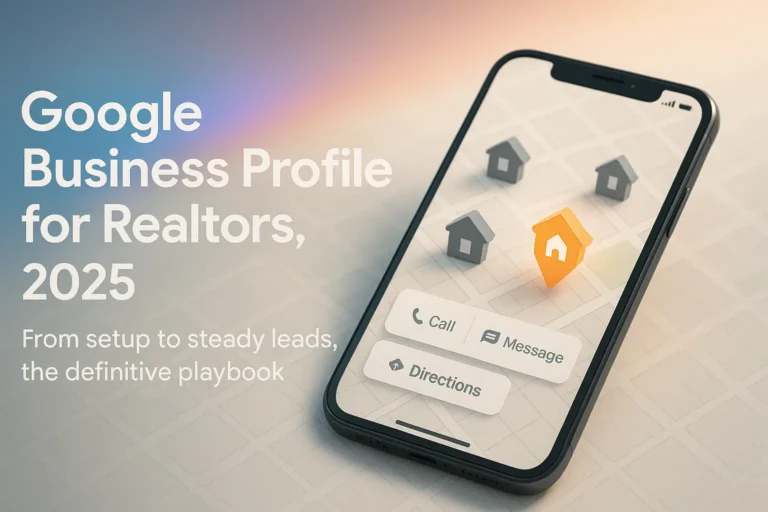

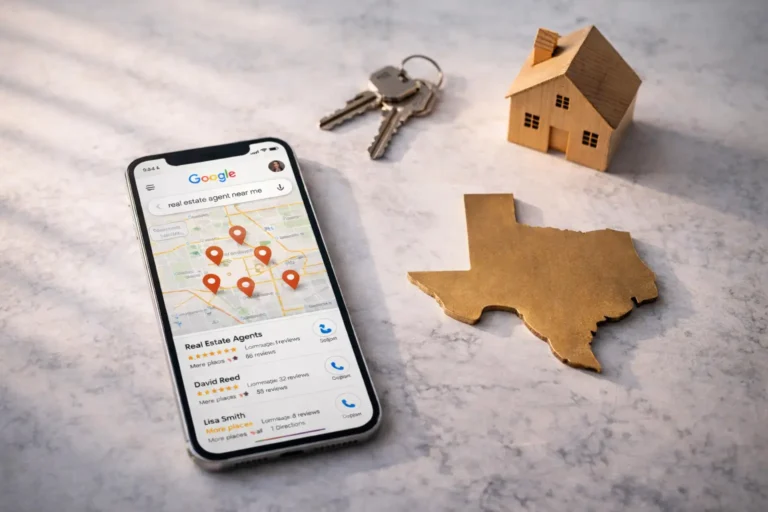
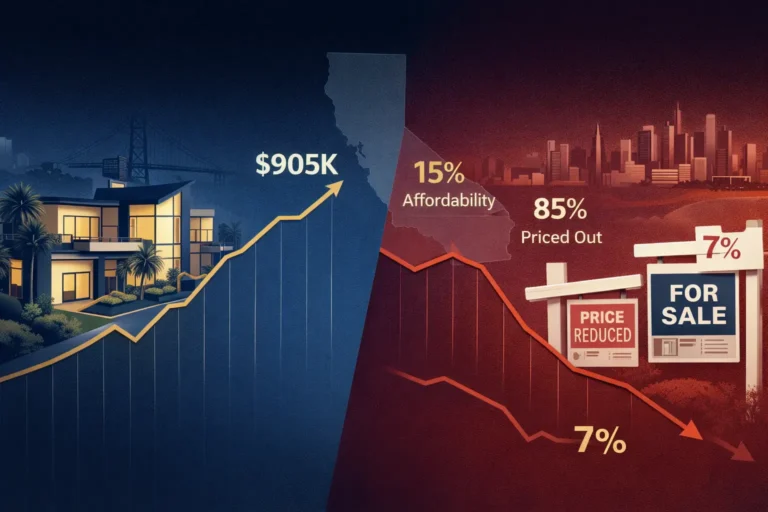
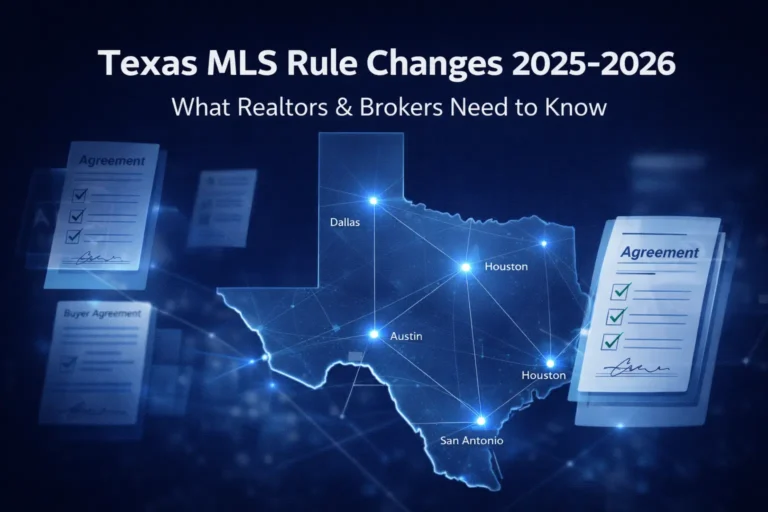

2 Comments